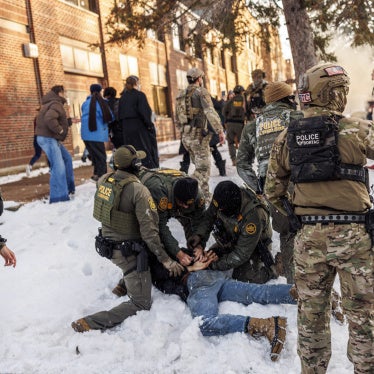The U.S. appellate court decision ordering the release of Jose Padilla, whom President George W. Bush had designated an “enemy combatant,” is a welcome affirmation of the rule of law and the right to liberty, Human Rights Watch said today.
The Court of Appeal for the Second Circuit court today rejected the government’s contention that the president’s constitutional powers as commander-in-chief gave him the authority to detain a U.S. citizen captured on U.S. soil and far from any battlefield.
Human Rights Watch applauded the court’s decision as being consistent with international law. In the case of persons apprehended outside areas of armed conflict and having no direct connection to a conflict, the protections of international human rights law must apply in full and cannot be displaced by the laws of war. These protections include the rights to be formally charged and permitted access to counsel.
“The Padilla case involved the question of whether a U.S. citizen can be locked up, denied access to lawyers, and called an ‘enemy combatant,’ just on the president’s say-so,” said Jamie Fellner, director of the U.S. program at Human Rights Watch. “The court has ruled that the president can’t do that. It’s a huge rebuke of the Bush administration’s assertion of this unilateral power.”
Agents of the U.S. Federal Bureau of Investigation (FBI) arrested Padilla on a material witness warrant on May 8, 2002, as he arrived at Chicago’s O’Hare Airport. He carried no arms or explosives. He was confined in a federal prison in New York, where he was given an attorney and allowed to consult with her.
On June 9, 2002, two days before a federal district court was to consider the motion filed by Padilla’s attorney to vacate the material witness warrant, President Bush issued an order designating Padilla as an enemy combatant and directing Secretary of Defense Donald Rumsfeld to take him into military custody. The government contended that Padilla met with members of al-Qaeda in Afghanistan and Pakistan, developed a plan with them to build and detonate a “dirty bomb” in the United States, and had returned to the United States to further this plan.
For the past 18 months, the U.S. military has held Padilla in a high-security naval brig in Charleston, South Carolina. The Bush Administration has refused Padilla permission to communicate with his family, with counsel or with any non-military personnel.
The U.S. Court of Appeal for the Second Circuit found that the president lacks authority under the Constitution to detain Padilla as an enemy combatant, given that Padilla is a U.S. citizen who had not been seized on a foreign battlefield or while actively engaged in armed conflict against the United States.
Moreover, federal legislation expressly forbids federal detention of any U.S. citizen in the United States without congressional authorization. Congress passed this statute in 1971 in a deliberate effort to prevent any repetition of the detention of U.S. citizens as had occurred with the internment of Japanese-Americans during World War II. Congress has not authorized President Bush to detain militarily U.S. citizens apprehended in the United States.
“If the U.S. government believes Padilla has engaged in a conspiracy with al-Qaeda to carry out terrorist acts in the United States, it should bring criminal charges against him and try him in a civilian court of law,” said Fellner. “The due process protections of the right to liberty cannot be abrogated with a stroke of the president’s pen.”
Padilla is one of three persons detained as enemy combatants inside the United States. Yasser Hamdi was allegedly captured in Afghanistan, held at Guantánamo Bay, and then transferred to a naval brig in Virginia once it was learned that he was a U.S. citizen. Ali Saleh Kahlah al-Marri, a Qatari national living in the United States, was designated an enemy combatant in June and transferred from the criminal justice system, where he was facing charges of fraud and lying to the FBI, to indefinite military detention.








